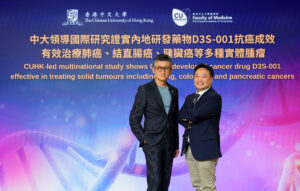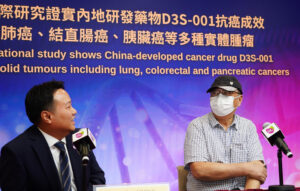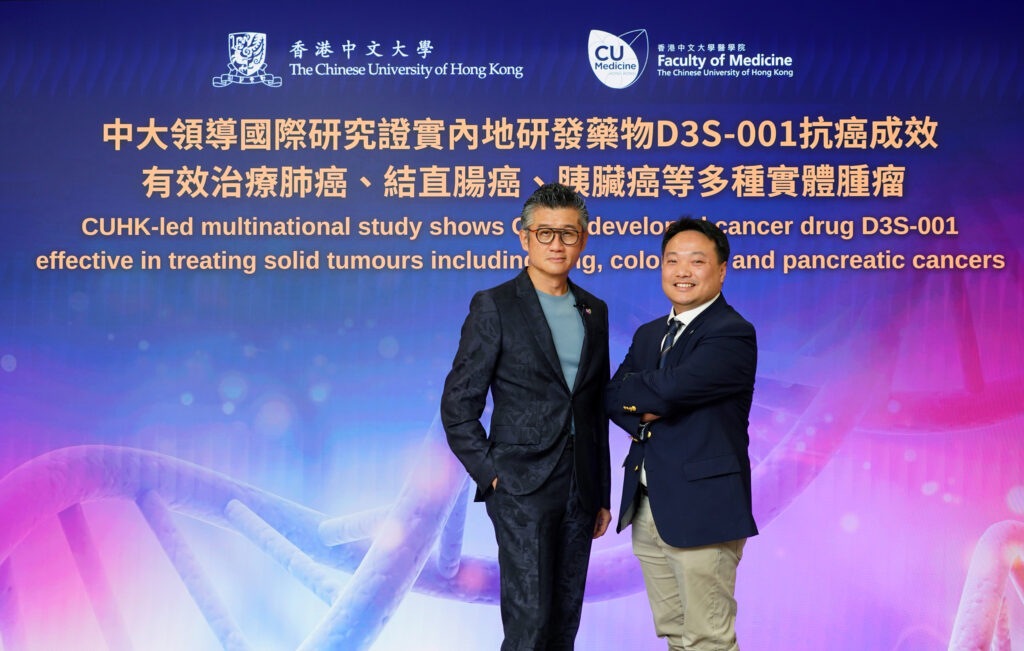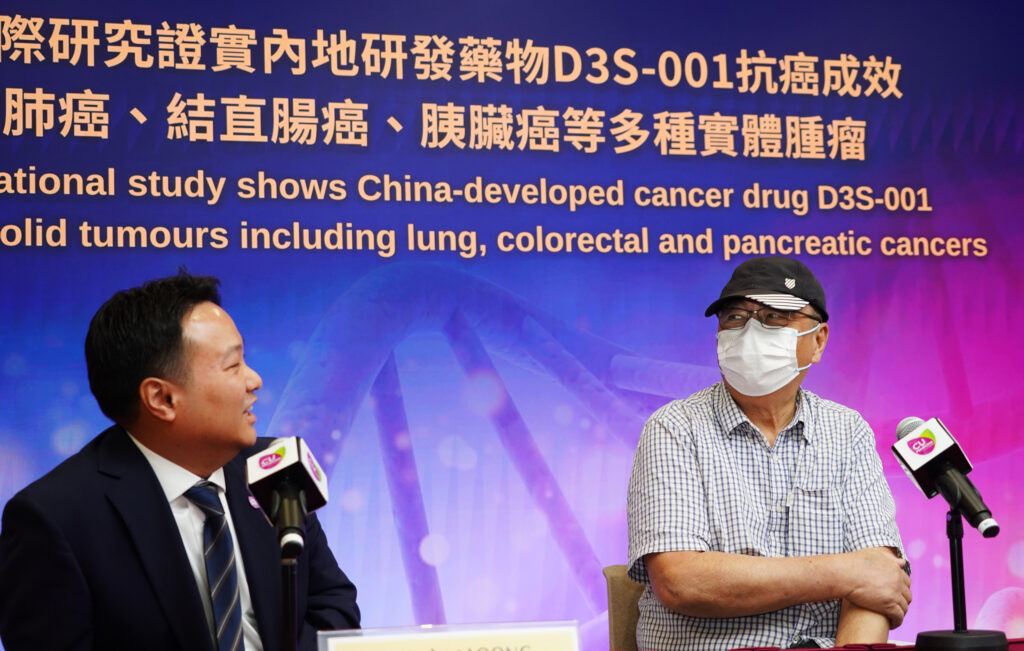CUHK
News Centre
CUHK-led multinational study shows new China-developed cancer drug D3S-001 is effective in treating solid tumours, including lung, colorectal and pancreatic cancer
A multinational study led by The Chinese University of Hong Kong (CUHK)’s Faculty of Medicine (CU Medicine) proved that D3S-001, a next-generation KRAS-G12C inhibitor developed in mainland China, showed promising results in treating various types of solid tumours in terms of anti-tumour activity, safety and tolerability giving hope to cancer patients with KRAS-G12C gene mutations. The findings have been published in the renowned medical journal Nature Medicine.
KRAS gene mutations implicated in many cancers
KRAS gene mutations are common oncogenic drivers in solid tumours, including non-small-cell lung cancer (NSCLC), colorectal cancer and pancreatic cancer. KRAS-G12C is the most prevailing subtype of KRAS gene mutation and is found in 11-15% of patients with NSCLC. Historically, there were limited viable therapeutic options targeting KRAS mutations; especially in colorectal cancer, it is necessary to combine a KRAS inhibitor with anti-EGFR antibodies for a satisfactory treatment outcome. Addressing this unmet need, a biotechnology company in the mainland has developed a new generation of KRAS-G12C inhibitor, D3S-001, to enhance efficacy and overcome cancer-drug-tolerant persistence.
Professor Tony Mok Shu-kam, Li Shu Fan Professor of Clinical Oncology, Associate Dean (Translation and Entrepreneurship) and Chairman of the Department of Clinical Oncology at CU Medicine, led an international research team from South Korea, Australia, the United States, mainland China and Hong Kong in a Phase 1 clinical trial of D3S-001 to treat NSCLC, colorectal and pancreatic cancers. The trial consisted of two parts:
- Dose escalation (Phase 1a): 42 patients carrying the KRAS-G12C mutation were enrolled and received daily D3S-001 doses of 50 mg to 900 This part was designed to evaluate safety, tolerance and optimal dosage of D3S-001 for the patients.
- Dose expansion (Phase 1b): 20 NSCLC patients pretreated with KRAS-G12C inhibitors and experienced disease progression were enrolled and received D3S-001. This part was designed to evaluate treatment response.
D3S-001 demonstrates promising performance in anti-tumour activity, safety and tolerability
Study results showed the overall safety of D3S-001 is good. The common side effects reported include nausea and diarrhea, with severity ranging from mild to moderate. Data showed a daily dose of less than 600 mg is sufficient to completely suppress the KRAS-G12C mutant gene protein in plasma.
Promising anti-tumour activity and prolonged response of D3S-001 were observed in patients who received KRAS inhibitors for the first time. Among those who had never received such inhibitors before, after being treated with D3S-001, with an objective response rate (ORR) of over 70%, meaning more than 70% of patients experienced significant shrinkage or disappearance of the tumour. The disease control rate (DCR) was over 97%, meaning the proportion of patients whose tumours were maintained in a stable state. The six-month duration of response reached 70%.
For patients who had received KRAS inhibitors before the trial, D3S-001 resulted in an ORR of 30% and a DCR of 80%, showing that the novel drug has a certain degree of anti-tumour effect on patients who have developed cancer drug resistance.
A proportion of patients with brain metastases had intracranial tumour shrinkage or stable intracranial disease, meaning D3S-001 can cross the blood-brain barrier and take effect in the central nervous system. The research team also found that patients with rapid reduction or absence of KRAS-G12C mutant allele frequency (MAF) had better treatment results than others.
Dr Herbert Loong Ho-fung, Associate Professor in the Department of Clinical Oncology at CU Medicine, said: “The study findings showed D3S-001 is superior to first-generation KRAS inhibitors, especially in colorectal cancer, where it can achieve a high remission rate when used alone, without the need for combination with anti-EGFR antibodies, overcoming the limitations of existing KRAS inhibitors. For patients who had disease progression after treatment with KRAS inhibitors, D3S-001 still offers a 30% remission rate, addressing the issue of drug resistance. Moreover, it has only mild side effects, requiring only once-daily dosing, making it convenient and safe for long-term use.”
Professor Mok added: “We had a fruitful collaboration with D3Bio, a China-based pharmaceutical company, on development of D3S-001. Data from this multi-national phase I study has demonstrated higher efficacy of this next generation KRAS-G12C inhibitor, and more so, we have shown the unique position of Hong Kong working with novel biotechnology companies from China in leading global development. I am proud that CUHK is at the epicentre of this phenomenal movement.”

A multinational study led by CU Medicine proved that D3S-001, a next-generation KRAS-G12C inhibitor developed in mainland China, showed promising results in treating various types of solid tumours in terms of anti-tumour activity, safety and tolerability giving hope to cancer patients with KRAS-G12C gene mutations. Research team members include Professor Tony Mok Shu-kam (left), Li Shu Fan Professor of Clinical Oncology and Chairman of the Department of Clinical Oncology; and Dr Herbert Loong Ho-fung, Associate Professor in the Department of Clinical Oncology at CU Medicine.

Mr Yu had received immunotherapy and chemotherapy after being diagnosed with lung cancer but developed resistance to these prior treatments later. He was then referred to join the clinical trial of CU Medicine for D3S-001 treatment. His tumours shrank and even disappeared after treatment and his shortness of breath was relieved. His case shows overall good tolerance to treatment after undergoing 60 weeks of treatment.





